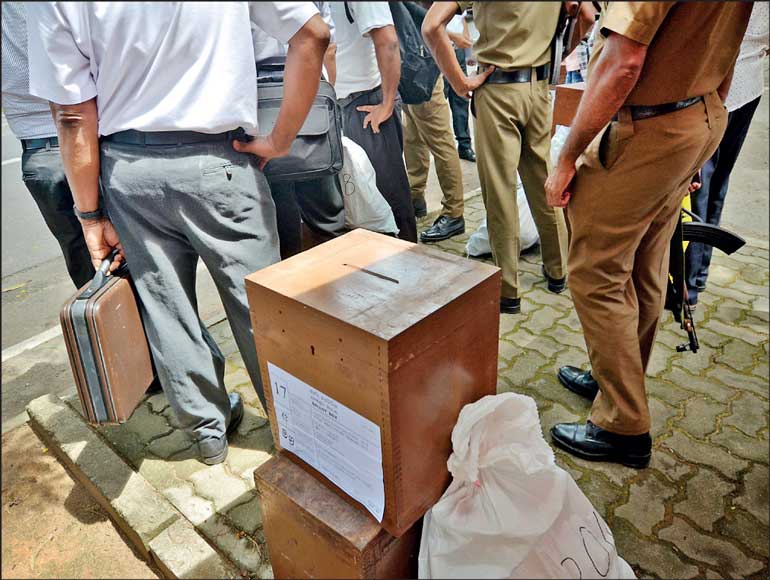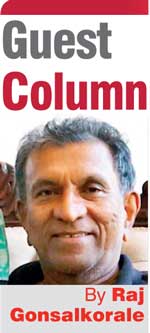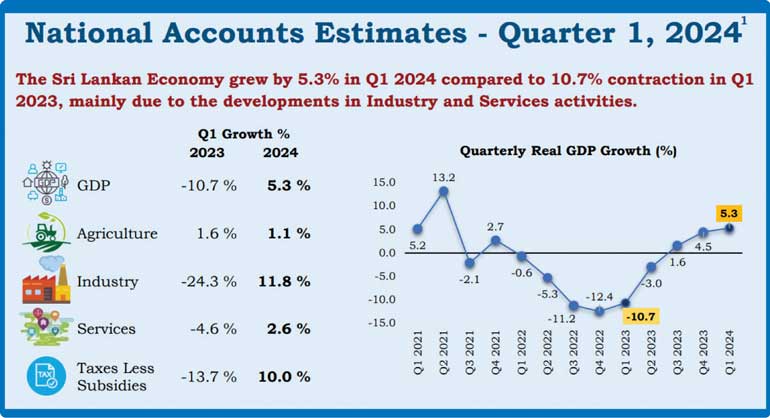Wednesday Feb 25, 2026
Wednesday Feb 25, 2026
Saturday, 21 September 2024 00:00 - - {{hitsCtrl.values.hits}}

They need to make a careful decision on 21 September when they cast their votes as to who is best placed to guide the country’s destiny in the next five years – Pic by Shehan Gunasekara
 “It’s the economy, stupid” quote by Bill Clinton is a phrase that was coined by Jim Carville in 1992. It is often quoted from a televised quip by Carville as “It’s the economy, stupid.” Carville was a strategist in Bill Clinton’s successful 1992 US presidential election against incumbent George H.W. Bush – Wikipedia
“It’s the economy, stupid” quote by Bill Clinton is a phrase that was coined by Jim Carville in 1992. It is often quoted from a televised quip by Carville as “It’s the economy, stupid.” Carville was a strategist in Bill Clinton’s successful 1992 US presidential election against incumbent George H.W. Bush – Wikipedia
An article by Stephen Koukoulas on Yahoo Finance appearing on 13 September titled “China collapse fuelling $ 180 billion bloodbath as Australia’s backbone threatened” gives a disturbing picture for Australia’s economy which is heavily reliant on China which Koukoulas says is in a deflationary spiral. He goes on to say that there are clear signs that inflation around the world will fall further, based squarely on slumping demand as growth weakens. He says, “Given the most recent trends in global growth and commodity prices, the Australian trade surplus will shrink further and could easily swing into deficit within the next year.” (https://au.finance.yahoo.com/news/china-collapse-fuelling-180-billion-bloodbath-as-australias-backbone-threatened-200024785.html)
The implication for Australia arising from the Chinese slowdown could well affect many other countries which are trading with China when domestic conditions are already problematic (low GDP growth, and rising unemployment). While the situation presented by Koukoulas is in reference to Australia, Sri Lankan trading partners could also be affected, and the country’s planned export expansion and even tourism could well get impacted consequently
The Sri Lankan economy is very fragile and there is a long way to go before one could say it’s out of the woods. The country’s debt-to-GDP ratio has been reported as 116% by the IMF based on Central Bank data. There is high unemployment although several initiatives have been taken by the current Government to expand employment and self-employment opportunities. This coupled with the low foreign exchange reserves of the country ($ 5.56 billion) places the country in a very vulnerable position as it cannot raise more debt, not more than 5% of GDP as per President Wickremesinghe, and cannot print any rupee currency, possibly as part of the agreement with the IMF.
If these financial disciplinary measures are broken, it places at risk the IMF withdrawal of their support to Sri Lanka, and the consequent reluctance by international agencies like the World Bank, ADB and bilateral loan providers like India, China, Japan and others to lend any more money to Sri Lanka. If the country’s current and potential trading partners, especially for its export markets, are impacted, the country could face an economic situation even worse than what it experienced in 2022. The last resort borrowings that the country has been making, which incidentally has been the main cause of the economic bankruptcy of the country in 2022, namely International Sovereign Bonds, will attract substantially higher interest rates than the already high interest rates.
Although Sri Lanka’s GDP rose 4.7% year on year in the second quarter of 2024, it is down from a 5.3% growth in the previous quarter. How the country’s economy is managed in the coming months and years is paramount, as without consolidation, sustainability and growth, any global meltdown on account of China’s slowdown will impact on Sri Lanka which has just emerged from a seriously bad economic situation.

https://www.tradingview.com/news/te_news:429243:0-sri-lanka-gdp-grows-4-7-in-q2-2024/#:~:text=Sri%20Lanka’s%20GDP%20rose%204.7,highest%20in%20nearly%203%20years.
(https://www.tradingview.com/news/te_news:429243:0-sri-lanka-gdp-grows-4-7-in-q2-2024/#:~:text=Sri%20Lanka’s%20GDP%20rose%204.7,highest%20in%20nearly%203%20years.)
As can be seen from the given graph, the disastrous situation in in 2022 to 2023 when growth was negative has been arrested and the current trajectory presents a more positive growth for 2024, although the drop in GDP growth to 4.7% from 5.3% noted above is worrying. The following Central Bank National Accounts estimate for quarter 1 of 2024 also showed similar positive news in 2024 and it is imperative for the country to grow its GDP in the next two quarters this year and then in 2025 and beyond.
Political reality
These statistics must be good news for the country and all Presidential candidates. Of course, political reality will be such that only the Government and candidate Ranil Wickremesinghe, the incumbent President, will acknowledge these and celebrate them.
However, the voters should note these in the backdrop of acknowledgements and criticisms and the challenges before it should the global impact on China’s predicted slowdown has a direct or indirect impact on Sri Lanka’s economy. They need to make a careful decision on 21 September when they cast their votes as to who is best placed to guide the country’s destiny in the next five years. Proven experience and achievements should be important factors that needs to be considered, and not experimentation.
Election promises made by candidates, with no indication where funds are coming to implement them, will result in the opposite of growth and possibly an economy that will teeter towards negative growth. The above positive economic news is still akin to the country as a whole walking on thin ice. The overall debt levels are far too high, foreign reserves still unhealthy and able to meet the country essential imports perhaps for just two to three months, foreign investments and exports still inadequate for continued economic growth. Tourism and remittances from overseas Sri Lankans have been healthy, thankfully, but they can be volatile as previous experience has shown.
Economic consolidation therefore must be the priority of any incoming President as it would be grossly irresponsible and even bordering on economic treason for whoever is the next President to play around the economy as someone lost in the sea, and someone in a boat without a paddle, so to speak. President Wickremesinghe who must be credited for the country’s economic recovery however tenuous it is, has clearly outlined this priority should he win the election, but other contenders have not done so, and instead made many promises that will cost large sums of money to implement. Some have taken great trouble to speak about long term plans and long-term visions. These are no doubt necessary, and public pronouncements in this regard are welcome developments. Unfortunately, such statements are and will be hollow, unless they also articulate what their plans are for consolidating the current, still shaky economy.

The foundation for growth must be a more stable economy, with parameters for at least its fundamentals like a debt ceiling (local and foreign), a debt to GDP ratio perhaps at a maximum of 75% of GDP, increase in income without burdening the less advantaged segment of the people, but introducing legal measures to widen the tax net and catch tax evaders, and ensuring expenditure does not exceed income.
The bidding war of promises
Voters should also give thought to what might happen if an incoming President acts contrary to the objective of consolidation and instead allow the slide of the current positive situation to negative territory through actions that are irresponsible and erratic and just populist propaganda activity in preparation to the general election that will follow the Presidential election. As much as voters will be made more and more promises during the Presidential election by some contenders, the bidding war of promises will intensify during the general election as the political parties and coalitions will be vying for power either to support the elected President or to thwart the elected President in Parliament.
Voters should also consider the background of candidates and political parties they represent or those who are backing by them. Besides the cancer of corruption that has spread far and wide amongst politicians, and the country in general, violence perpetrated by some to win power in the past too needs careful consideration by voters. As quipped by many today, if the corrupt elements amongst politicians are to be eliminated from the political scene, there won’t be anyone left in the scene!
Many promises being made by contenders will no doubt require Parliamentary approval, and a supportive Parliament will be required by whoever who gets elected to implement such promises. This needs to be noted by voters as erratic and grandiose promises, could turn out to be just that. They should weigh the realistic nature and economical possible promises against populist, unrealistic and economically irresponsible ones prior to casting their votes as they will be the ones who would have got misled by the latter category of promises. They and generations to come will pay a heavy price unless they do this evaluation.
“Power does not corrupt men; fools, however, if they get into a position of power, corrupt power” – George Bernard Shaw